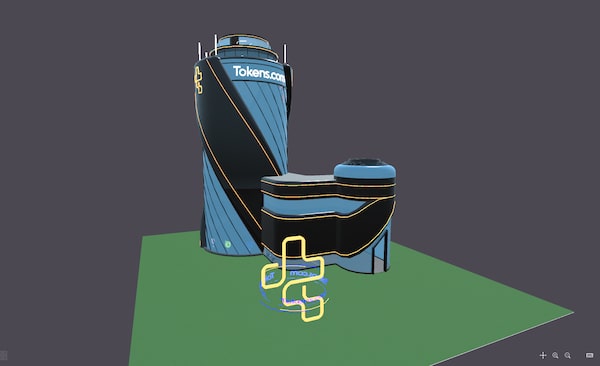
A rendering for the office tower being built by Tokens.com in Decentraland. A handful of upstart companies are spending millions to purchase land in online worlds.Tokens.com
This past year saw the emergence of many novel and perplexing investing trends, such as the Reddit-driven frenzy around meme stocks and the explosion in non-fungible tokens (NFTs). The latest is no less confounding to those on the outside: real estate in the metaverse.
A handful of upstart companies are spending millions to purchase land in online worlds that can only be visited on computer screens or through virtual reality headsets – worlds with names such as Decentraland, Sandbox and Somnium Space. These virtual real estate moguls plan to monetize their pixels through property development, rental income and advertising.
One company angling to become a digital land baron is Toronto-based Metaverse Group. “I went down the metaverse rabbit hole about a year and a half ago, and decided it was the future of the internet,” said Michael Gord, the company’s co-founder and chief operating officer. Today, Metaverse Group’s digital real estate portfolio is worth roughly $10-million, he said.
Dividend, cryptocurrency and metaverse funds are among Canada’s latest ETF launches
Explaining virtual land to the uninitiated isn’t easy, but let’s start with the metaverse. The loosely defined term can be used to describe any online world that multiple people can inhabit at the same time. Some multiplayer video games could be said to fall under the metaverse umbrella. So could less structured virtual spaces such as Second Life, an online world that replicates the mundane tasks of everyday existence, such as shopping and talking with friends.
Facebook helped popularize the term when it changed its name to Meta in October. The rebrand is an emblem of the company’s long-term bet that users will increasingly spend time in virtual worlds.
Purchasing digital land is not a new concept. But as the hype around the metaverse has inflated this year, so has interest in virtual real estate. There are different online realms for purchasers to choose from. One of them is Decentraland, whose creators raised about US$26-million in 2017 and opened their online playground to the public in February, 2020.

Tokens.com
Decentraland is a cartoonish 3D city where users, represented by on-screen avatars, can chat with one another, gamble and attend concerts and other events. In October, Canadian electronic musician Deadmau5 staged a show there, as did Paris Hilton. Well, sort of. A Paris Hilton avatar appeared on a digital stage, jumping and occasionally flailing her arms to prerecorded dance music, while stock footage of the real Ms. Hilton played in the background.
One of the primary activities for Decentraland users today is shopping. They can purchase digital clothing and accessories for their avatars, or digital artwork. Each virtual object is considered an NFT – a digital asset whose ownership is recorded on an online public ledger called a blockchain. An NFT can only have one owner at a time, meaning it can be traded and resold almost as though it were a physical object.
Sotheby’s set up a gallery in Decentraland last year to auction NFT artwork, and Atari, the video game company, built a casino. In other virtual worlds, fashion brands such as Gucci sell NFT clothing. Nike Inc. bought a company in December that makes virtual footwear.

Tokens.com
Virtual land parcels can be NFTs, as well. And virtual worlds, just like the real world, have limited supplies of real estate.
Mr. Gord at Metaverse Group has long been interested in cryptocurrency and digital assets. He started organizing events, clubs and meet-ups in 2013. More recently, he began assembling a small land portfolio in virtual worlds and pooled his assets with Jason Cassidy, a friend and business partner, to form the Metaverse Group.
Last year, they sold half the company to Tokens.com, a Toronto-based crypto investment firm, in a deal valued at $1.68-million. Tokens.com has since invested an additional $5.5-million, bringing its ownership stake to 67 per cent.
“I saw the level of interest in these environments was increasing, largely because of COVID and the technology improvements in the last few years,” said Andrew Kiguel, the chief executive of Tokens.com, who previously co-founded bitcoin miner Hut 8 Mining Corp.
Opinion: Minting something from nothing: How NFTs are shaping the internet of tomorrow
He also saw parallels to cryptocurrency. Just as the total number of bitcoins is capped, the number of real estate plots in Decentraland is limited to 90,000. “If we can buy that space, it certainly has value,” he said – particularly for advertisers, who are constantly looking for new ways to reach consumers and could be enticed to purchase space on digital billboards.
At its core, the Metaverse Group is not unlike an actual real estate developer. It looks for parcels of land close to where users are already congregating, and builds there. Transactions are usually conducted in a cryptocurrency unique to each digital world.
The Metaverse Group is nearing completion of an office tower in Decentraland, and in November it paid about US$2.5-million – at the time, a record price – for plots in the online world’s Fashion District. “We’re building a Rodeo Drive or Fifth Avenue type neighbourhood where there’s going to be iconic shops,” Mr. Gord said. He’s betting retailers will pay rent to set up digital storefronts where they can sell NFT wearables.
In March, the company plans to stage a metaverse fashion week. A virtual fashion show would operate just like one in the real world, according to Mr. Gord – except with avatars modelling NFT clothing available for purchase.
There is already a shopping district in Decentraland, anchored by two digital-only retailers selling NFT garments. The builder, a U.S. company called Republic Realm, hired a real-world architect to design the area, which is modelled after the Harajuku district in Tokyo.
Sales have been minimal so far, said Republic Realm CEO Janine Yorio. “Anybody who’s doing something in the metaverse today is doing it to build brand awareness,” she said. “They’re not necessarily doing it to make tons and tons of money.”

Tokens.com
Still, companies are spending large sums to stake claims. In November, Republic Realm spent US$4.3-million to buy land in another virtual world, Sandbox, breaking the record set by Tokens.com for the biggest digital land sale. In total, Republic Realm owns 2,700 parcels of land in 24 virtual worlds.
The risks of such purchases are plentiful. There is no way to know which virtual world will succeed over the long term, or even if the entire concept of the metaverse will have lasting appeal. And while the amount of virtual land in Decentraland may be finite, the community’s developers could decide to add more, potentially depressing property values.
Mr. Gord pointed out that Decentraland is run as a decentralized autonomous organization, meaning there is no single leader. Decentraland would add more land only if users supported it, he said.
He does not spend much time casually in the metaverse himself. “There’s still not that many experiences to do,” he explained.
During a recent visit to Decentraland, some neighbourhoods were sparsely populated and few users were interested in conversation. At a virtual holiday party thrown by an American social-media marketing agency, several avatars stood around, zombie-like, before signs directing others to follow the agency on Twitter and Instagram.
Proponents of the metaverse have a long-term view, according to Ms. Yorio. Kids and teenagers already spend hours playing online games such as Minecraft and Roblox.
“All you have to do is envision what the world looks like when those children have aged out of Minecraft,” she said, “and still want to have an interactive and immersive technology experience.”
Your time is valuable. Have the Top Business Headlines newsletter conveniently delivered to your inbox in the morning or evening. Sign up today.
 Joe Castaldo
Joe Castaldo